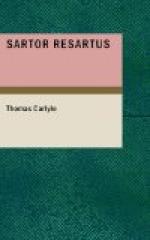for he knew nothing except Boxing and a little Grammar,
showed less of that aristocratic impassivity, and
silent fury, than for most part belongs to Travellers
of his nation. To him I owe my first practical
knowledge of the English and their ways; perhaps also
something of the partiality with which I have ever
since regarded that singular people. Towgood
was not without an eye, could he have come at any
light. Invited doubtless by the presence of
the Zahdarm Family, he had travelled hither, in the
almost frantic hope of perfecting his studies; he,
whose studies had as yet been those of infancy, hither
to a University where so much as the notion of perfection,
not to say the effort after it, no longer existed!
Often we would condole over the hard destiny of the
Young in this era: how, after all our toil,
we were to be turned out into the world, with beards
on our chins indeed, but with few other attributes
of manhood; no existing thing that we were trained
to Act on, nothing that we could so much as Believe.
’How has our head on the outside a polished
Hat,’ would Towgood exclaim, ’and in the
inside Vacancy, or a froth of Vocables and Attorney-Logic!
At a small cost men are educated to make leather
into shoes; but at a great cost, what am I educated
to make? By Heaven, Brother! what I have already
eaten and worn, as I came thus far, would endow a
considerable Hospital of Incurables.’—’Man,
indeed,’ I would answer, ’has a Digestive
Faculty, which must be kept working, were it even
partly by stealth. But as for our Miseducation,
make not bad worse; waste not the time yet ours, in
trampling on thistles because they have yielded us
no figs.
Frisch zu, Bruder! Here are
Books, and we have brains to read them; here is a whole
Earth and a whole Heaven, and we have eyes to look
on them:
Frisch zu!’
“Often also our talk was gay; not without brilliancy,
and even fire. We looked out on Life, with its
strange scaffolding, where all at once harlequins
dance, and men are beheaded and quartered: motley,
not unterrific was the aspect; but we looked on it
like brave youths. For myself, these were perhaps
my most genial hours. Towards this young warm-hearted,
strong-headed and wrong-headed Herr Towgood I was even
near experiencing the now obsolete sentiment of Friendship.
Yes, foolish Heathen that I was, I felt that, under
certain conditions, I could have loved this man, and
taken him to my bosom, and been his brother once and
always. By degrees, however, I understood the
new time, and its wants. If man’s Soul
is indeed, as in the Finnish Language, and Utilitarian
Philosophy, a kind of Stomach, what else is
the true meaning of Spiritual Union but an Eating
together? Thus we, instead of Friends, are Dinner-guests;
and here as elsewhere have cast away chimeras.”
So ends, abruptly as is usual, and enigmatically,
this little incipient romance. What henceforth
becomes of the brave Herr Towgood, or Toughgut?
He has dived under, in the Autobiographical Chaos,
and swims we see not where. Does any reader
“in the interior parts of England” know
of such a man?




